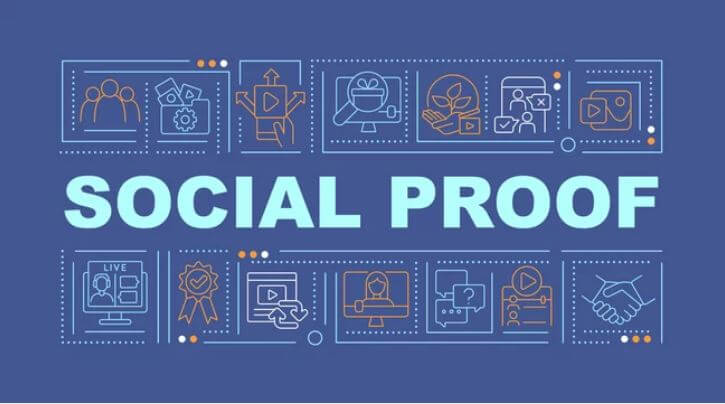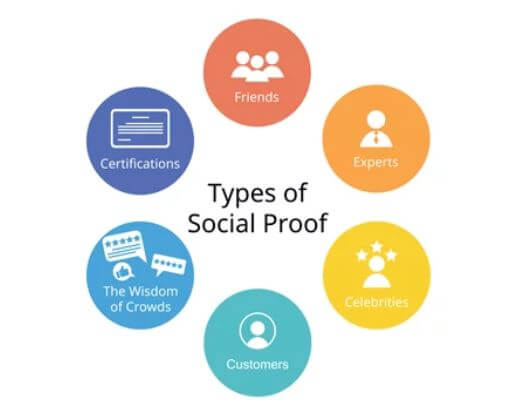Social Proof
Introduction:
Social proof is a psychological phenomenon in which people rely on the behavior and opinions of others to guide their actions and decisions. It is a powerful tool that businesses can use to influence customer behavior and increase conversions. By showing that others have made a particular choice or purchase, social proof can create a sense of trust, legitimacy, and safety around a product or service.
Importance of Social Proof:
Social proof is critical in shaping consumer behavior in the digital age. With an endless array of online options and information, people often turn to social proof as a shortcut for decision-making. Some of the reasons why social proof is so necessary to include:
- Trust: Consumers are likelier to trust a product or service vetted by others, especially those they know or admire.
- Legitimacy: Social proof can help establish the credibility and authority of a business, especially in a crowded marketplace.
- Safety: People feel safer making a purchase or taking action when they know others have done the same without negative consequences.
- Conversions: Social proof can be a powerful tool for increasing conversions and sales, as it helps overcome customer hesitation and uncertainty.
Types of Social Proof
There are several different types of social that businesses can use to influence customer behavior:
Expert Social Proof:
This type of social proof involves using endorsements or testimonials from experts in a particular field or industry. For example, a skincare brand might use a quote from a dermatologist to highlight the effectiveness of its product. Expert social proof is particularly effective when the endorser is well-respected and trusted in their field.
Celebrity Social Proof:
Celebrity endorsements are a form of social proof that can be particularly effective for products or services perceived as aspirational or high-end. By associating a brand with a well-known celebrity, businesses can create a sense of glamour and desirability around their product. However, it’s important to note that celebrity endorsements can also be expensive and may not always be effective if the celebrity doesn’t resonate with the target audience.
User Social Proof:
User social proof involves showcasing positive social proof and reviews or testimonials from actual customers. This can be done through customer reviews on a website, social media posts, or testimonials on marketing materials. User social proof is particularly effective because it provides real-life examples of how a product or service has benefited others.
Wisdom of Crowds Social Proof:
The wisdom of crowds refers to the idea that large groups are often better at making decisions than individuals. Businesses can leverage the wisdom of crowds by showing statistics or numbers that highlight the popularity of their product or service. For example, a restaurant might advertise that it has served over 1 million customers. This type of social proof can create a sense of trust and legitimacy around a brand.
Social proof is a powerful tool for businesses looking to influence customer behavior and increase conversions. By showcasing endorsements, testimonials, and other social proof, companies can establish trust, credibility, and authority with their target audience. However, it’s essential to use social proof ethically and avoid misrepresenting or exaggerating the impact of your product or service. Ultimately, social proof should be seen as a supplement to a strong product or service rather than a replacement.
Examples of Social Proof
There are numerous examples of social that businesses can use to influence customer behavior. Here are a few common examples:
Customer Reviews:
Customer reviews are one of the most potent forms of social proof. By showcasing positive reviews and ratings from satisfied customers, businesses can create a sense of trust and legitimacy around their products or service. Checks can be displayed on a company’s website, social media platforms, or third-party review websites like Yelp or Google Reviews.
Testimonials:
Testimonials are similar to customer reviews but are often more in-depth and personal. Testimonials may feature quotes from satisfied customers or case studies that highlight the benefits of a particular product or service. Testimonials can be featured on a company’s website or in marketing materials like brochures or ads.
Social Media Mentions:
Social media platforms like Twitter, Facebook, and Instagram can be powerful tools for showcasing social proof. When customers share positive experiences with a product or service on social media, it can create positive buzz and word-of-mouth advertising.
Influencer Endorsements:
Influencer marketing has become a popular way for businesses to leverage social proof. By partnering with influencers in a particular niche or industry, companies can tap into the influencer’s existing audience and create a sense of legitimacy and trust around their product or service.
Awards and Accolades:
Awards and accolades from industry organizations or publications can be powerful social proof. When a business wins an award or is recognized for its achievements, it can create a sense of legitimacy and authority in the eyes of potential customers.
Social proof is a powerful tool for businesses looking to influence customer behavior and increase conversions. Companies can establish trust, credibility, and authority with their target audience by showcasing positive reviews, testimonials, social media mentions, influencer endorsements, and awards. Ultimately, social proof should be seen as a supplement to a strong product or service rather than a replacement for it.
The Psychology behind Social Proof
Social proof is rooted in several psychological principles that make it a powerful tool for influencing behavior. Here are a few key psychological factors that drive social proof:
- Social Comparison:
People naturally tend to compare themselves to others, especially those who are similar. Social proof leverages this tendency by showing consumers how others like them have made similar choices or purchases. When people see others similar to themselves making a particular choice or purchase, they are more likely to follow suit.
- Informational Influence:
People often rely on the opinions and actions of others to help them make sense of a complex or uncertain situation. Social proof can provide valuable information to consumers about the benefits, quality, and safety of a particular product or service. By showing that others have already made a specific choice or purchase, social proof can help overcome consumer uncertainty and hesitation.
- Conformity:
Humans have a natural desire to conform to social norms and expectations. Social proof leverages this desire by showing consumers that a particular choice or behavior is popular or widely accepted. When people see that others are making a specific choice or purchase, they are more likely to follow suit to conform to social norms and expectations.
- Trust:
Social proof can also help build trust and credibility with consumers. When people see that others have already made a particular choice or purchase and had a positive experience, they are more likely to trust the product or service themselves.
How to Use Social Proof to Boost Your Business
Here are some strategies that businesses can use to leverage social proof effectively:
Display Customer Reviews:
Customer reviews are one of the most effective forms of social proof. Businesses can build trust and credibility with potential customers by showcasing positive reviews from satisfied customers. Display customer reviews prominently on your website, social media profiles, and product pages.
Use Testimonials:
Testimonials are another powerful form of social proof. Consider collecting testimonials from satisfied customers and featuring them prominently on your website or marketing materials. Testimonials can be in the form of written quotes, case studies, or even video testimonials.
Showcase Social Media Mentions:
Social media can be a powerful tool for showcasing social proof. Monitor social media platforms like Twitter, Facebook, and Instagram for mentions of your brand or products. When customers share positive experiences with your brand on social media, consider featuring those mentions on your website or social media profiles.
Partner with Influencers:
Influencer marketing can be a highly effective way to leverage social proof. Identify influencers in your niche or industry and consider partnering with them to promote your products or services. Influencers sharing positive experiences with your brand can create a ripple effect of positive buzz and word-of-mouth advertising.
Display Social Proof Badges:
Social proof badges, such as trust seals or certifications, can help build trust and credibility with potential customers. Consider prominently displaying badges on your website, especially checkout pages, to help reassure customers that their personal and financial information is secure.
Use Pop-Ups:
Pop-ups can be an effective way to showcase social proof. Consider using pop-ups to display customer reviews or testimonials or to encourage customers to share their positive experiences on social media.
Offer Social Proof Incentives:
Consider offering incentives to customers who share positive experiences with your brand on social media or leave a review. For example, you could offer a discount code or free shipping for customers who leave a review on your website or share a photo of themselves using your product on social media.
Ethical Considerations in Using Social Proof
Here are some ethical considerations that businesses should keep in mind when using social proof:
Authenticity:
Businesses need to ensure that their social proof is authentic and not fabricated. Falsifying social evidence can damage a business’s reputation and erode customer trust. It is essential to collect and display social proof honestly and transparently.
Privacy:
When using social proof, businesses must be mindful of customers’ privacy. This includes obtaining customers’ consent before sharing their personal information or testimonials and protecting their personal and financial information.
Inclusivity:
Businesses should strive to showcase diverse social proof that reflects their customer base. This includes featuring testimonials and reviews from customers of different ages, genders, races, and backgrounds.
Accuracy:
Businesses must ensure that their social proof accurately reflects their products or services. This includes verifying the accuracy of customer reviews and testimonials and avoiding misleading or exaggerated claims.
Responsibility:
Businesses are responsible for ensuring that their social proof is not harmful or offensive. This includes avoiding using social evidence that promotes harmful or discriminatory behavior, or that could be construed as exploitative or insensitive.
Transparency:
Businesses should be transparent about using social proof in their marketing strategies. This includes disclosing any incentives or compensation offered to customers for sharing positive experiences and providing clear information about collecting and using customer data.
While social proof can be a powerful marketing tool, businesses need to consider the ethical implications of its use. Companies must strive to use social proof in an authentic, transparent, and responsible manner that respects customers’ privacy, promotes inclusivity and avoids misleading or harmful practices. By following these ethical considerations, businesses can build trust, credibility, and authority with potential customers while upholding their moral obligations.
Conclusion
Social proof is a valuable marketing tool to help businesses build credibility, trust, and authority with potential customers. By leveraging different social proofs, companies can tap into the psychology of social proof and use it to their advantage. However, companies must also be mindful of the ethical considerations in using social proof. Authenticity, privacy, inclusivity, accuracy, responsibility, and transparency are vital considerations businesses must consider when using social proof.
Ultimately, the success of using social proof depends on its effective implementation and ethical use. By following best practices and being mindful of ethical considerations, businesses can use social proof to its full potential while building a trustworthy reputation with customers.
F.A.Q
Why is social proof necessary?
Social proof is essential for several reasons:
- Builds Trust: Social proof helps build trust between businesses and their potential customers by showcasing positive experiences and feedback from other customers.
- Influences Behavior: Social proof influences consumer behavior by providing evidence that others have used and benefited from a product or service.
- Increases Credibility: Social proof increases a business’s credibility by showing that its product or service is trusted and valued by others.
- Reduces Risk: Social proof reduces the perceived risk associated with trying a new product or service by providing evidence that others have already tried it and found it valuable.
- Enhances Engagement: Social proof enhances customer engagement by providing social validation that their experience and feedback are necessary and valued by the business.
Social proof is essential for businesses to build trust, credibility, and engagement with potential customers, ultimately leading to increased sales and success.
What is social proof in business?
Social proof in business is a marketing strategy that uses the power of positive feedback and experiences from previous customers to influence the behavior of potential customers. It is a psychological phenomenon that suggests people tend to follow the actions and decisions of others when they are uncertain about their own choices. By showcasing social proof, businesses can build trust, credibility, and authority with potential customers, ultimately leading to increased sales and success.
Social proof in business can take many forms, such as customer reviews and testimonials, celebrity endorsements, social media likes and shares, trust badges and seals, and case studies. By providing evidence of previous customer satisfaction and positive experiences, social proof helps reduce the perceived risk of trying a new product or service and influences consumer behavior in favor of the business. Overall, social proof is a powerful tool for companies to increase customer engagement and boost sales and has become an increasingly important component of modern marketing strategies.
How can I get social proof?
There are several ways to get social proof for your business:
- Customer Reviews and Testimonials: Encourage satisfied customers to leave reviews or testimonials on your website, social media pages, and third-party review sites like Yelp or Google My Business.
- Influencer Endorsements: Partner with influencers or celebrities who align with your brand values to endorse your product or service.
- Social Media Engagement: Encourage followers to engage with your content by liking, sharing, and commenting on posts.
- Trust Badges and Seals: Display trust badges and seals on your website, such as security certifications or awards, to build credibility and trust.
- Case Studies: Create and share case studies that showcase positive results and outcomes from previous customers.
- Media Mentions: Share any positive media coverage your business has received on your website and social media pages.
- User-Generated Content: Encourage customers to share photos or videos of themselves using your product or service on social media and repost the content on your channels.
Overall, there are many ways to get social proof for your business, and it’s crucial to choose strategies that align with your brand values and resonate with your target audience. By leveraging social proof, companies can build trust, credibility, and authority with potential customers, increasing sales and success.







